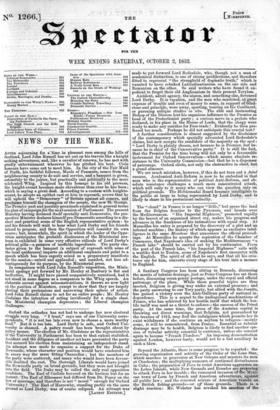NEWS OF THE WEEK.
ArrEit sojourning for a:time in pleasant. ease among the hills of Scotland, Lord John Russell has set out on his travels like a knight seeking adventures, and, like a cavalitiOf renown, he has met with goodly -entertainment wherever he has pitched his tent. Civic honours have come out to meet him. In the city of the Fair Maid of Perth, his faithful follower, Maule of Panmiire, comes from the neighbouring county to do suit and service, and a banquet is given, ostensibly to the junior, but practically and politically to the more celebrated Whig. Inspired by this homage to his old Prowess, the knight-errant becomes more chivalrous thin ever he has been ; which is saying a great deal. -.According to a custom with knights- errant, he adopts an epithet cast at him-in reproach, avows that he will uphold the "Democracy"- of Britain against all corners, and proclaims himself the champion of the people, the new St. George. The Premier past and possibly proximate explained in general terms his plan of campaign for the next session of Parliament. The present Ministry having declared itself specially anti-Democratic, the pro- spective Minister declares himself pro-Democratic according to a dis- creet and practical sense of the' English system : he and his friends will wait to hear what Lord Derby and his friends intend to-propose, and then the Opposition will. Consider its own course; but, meanwhile, the spirit in which the leader of the Oppo- sition anticipates the probable disclosures of the Ministerial nos- trum is exhibited in some very effective ridicule of Lord Derby's political pills—a panacea of ineffable ingredients. The party cha- racter given- to the banquet (a subject of reproach with some of the local ridnuncs) imparts an additional emphasis and point to a speech which has been eagerly seized as a preparatory manifesto' for the session—seized and applauded ; and assailed, not less ad- vantageously for its purpose, by the Ministerial press.
In comparison with Lord John Russell's exposition, the Minis- terial apology put forward by Mr. Henley at Banbury is flat and ineffective. It might have passed comparatively unnoticed, had it not stood in some degree as a companion to the Whig speech. An elaborate caveat against misconstructions, it throws no new light on the position of Ministers, except to show that they are largely abating their pretensions and narrowing their sphere of action. Lord John Russell claims to act for an entire people ; Mr. Henley disclaims the intention of acting invidiously for a single class. The Ministerial champion deprecates ; the Liberal champion challenges.


























